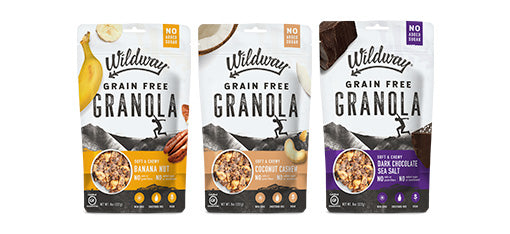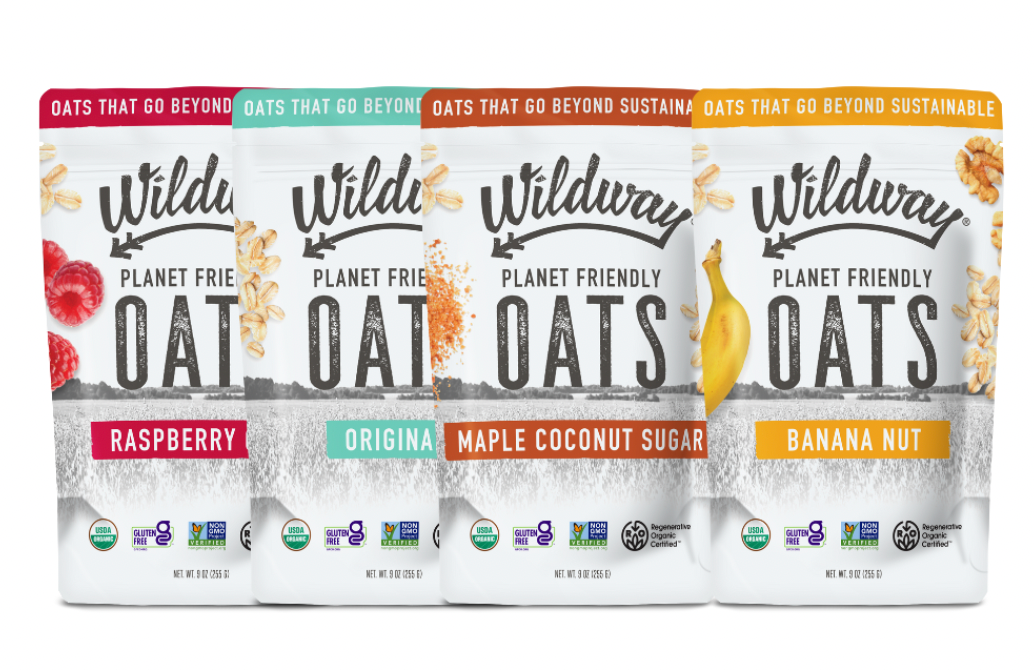1. Eat less meat and dairy
It’s no secret that consuming a plant-based diet is becoming more popular, and for good reason too. Not only does eating plant-based benefit our health, but reducing your meat and dairy consumption can have a profound impact on the environment – the methane emissions that originate from agriculture far outweigh those from growing fruits and vegetables. Lucky for you and your granola addiction, Wildway is vegan!
2. Shop plastic-free
Plastic reaches into nearly every aspect of our shopping habits, including the very free produce we purchase. Instead of reaching for the plastic bags in the produce aisle, bring your own reusable mesh produce bags or ditch the bag completely and just put them in your reusable shopping bag. Speaking of reusable bags, they don’t only come in handy at the grocery store, but in any store where your purchase might be placed in a plastic bag.
3. Ditch the single-use plastic sandwich and snack bags
Glass containers and reusable silicone food storage containers not only help the environment but also your wallet by saving you from purchasing single-use plastics over and over again. There are a variety of ways to use silicon reusable bags, click here for some ideas.
4. Reduce food waste
The saying ‘never shop on an empty stomach’ is something we could all be more mindful of. This pertains more so to produce and other foods that don’t have a long shelf life and, if purchased in excess, can go bad before we get a chance to consume them. Plan out what you will need throughout the week and purchase accordingly. It is better to fall short and make a second grocery trip than to buy too much and throw your money in the trash. For tips on reducing food waste click here.
5. Down with fast fashion – thrift and upcycle
We’ve all seen the mountains of used clothing that are a direct product of the fast fashion industry, and it’s incredibly upsetting, to say the least. Fast fashion focuses on fast and cheap clothing production to appeal to the current trends of the consumer without considering the implications it ultimately has on the environment after trends have come and gone. Thrifting is one trend that is again, not only helpful for the environment, but for our wallets as well. Upcycling means to repair or redesign your own clothes rather than throwing them in the trash and also gives you a chance to add your own personal touch to your items!
6. Travel alternatively – bike and walk
When possible, choose to walk and bike to your nearby destinations. The local coffee shop, grocery store, a friend’s house are all closer than you think. Biking and walking to your destinations are not only a great way to travel, but also help to sneak in some purposeful exercise.
7. Choose reusable cups and straws
This is one small practice that can make a monumental impact. Ditch the non-reusable cups and straws and invest in those you can use far longer. You could also be rewarded for your efforts by some coffee shops such as Starbucks who give a discount to those who bring in their own cups and mugs.
8. Dispose of your gadgets properly
E-waste is one we don’t often hear or think about when compared to plastic and energy waste, but that doesn’t mean it matters any less. Within electronics are heavy metals and chemicals that when thrown in landfills or recycled improperly can be dangerous to both the environment and the people who call that environment home. Large chains such as Best Buy, Staples, and Office Depot/Max have recycling programs to make it so you don’t have to do any of the hard work yourself!
9. Get political – vote for environmentally beneficial policies
Those we give power to give power to the things we think are important. Many of us do a good job researching political candidates (or in regard to policies) to find who most aligns with our values and protecting the environment should be one of those values we hold high. We may not be able to create and implement policy ourselves, but we do have a say when choosing those who do.
10. Support eco-friendly and sustainable companies + shop Local
Each purchase you make is an investment in the company itself. It’s so important to support companies who choose to leave this world better than they found it through sustainability and eco-friendly practices. Shopping local through farmers' markets helps to cut down on gas emissions from the transportation of food from all over the country and also helps to support your local farmers and small businesses.
11. Clean up your local parks
Join a local volunteer clean up group or go out on your own! Take a reusable bag with you on your next park stroll, or even through your own neighborhood, and collect trash along the way. Not only does this help to beautify your community but is also a perfect reason to get out and enjoy nature. For information on how to organize your own community clean up event click here.
12. Reduce your online purchases (yes, that means Amazon Prime too)
Online shopping, though convenient, is not the most helpful form of shopping for the environment. From bubble wrap to packing peanuts, plastic filling and more, there is an excess of unnecessary waste in our packaged shipments. If you are able to purchase the same product locally, although it might take a little more effort, may be the best option for the sake of the planet!
To read more on the butterfly effect:
https://www.americanscientist.org/article/understanding-the-butterfly-effect







